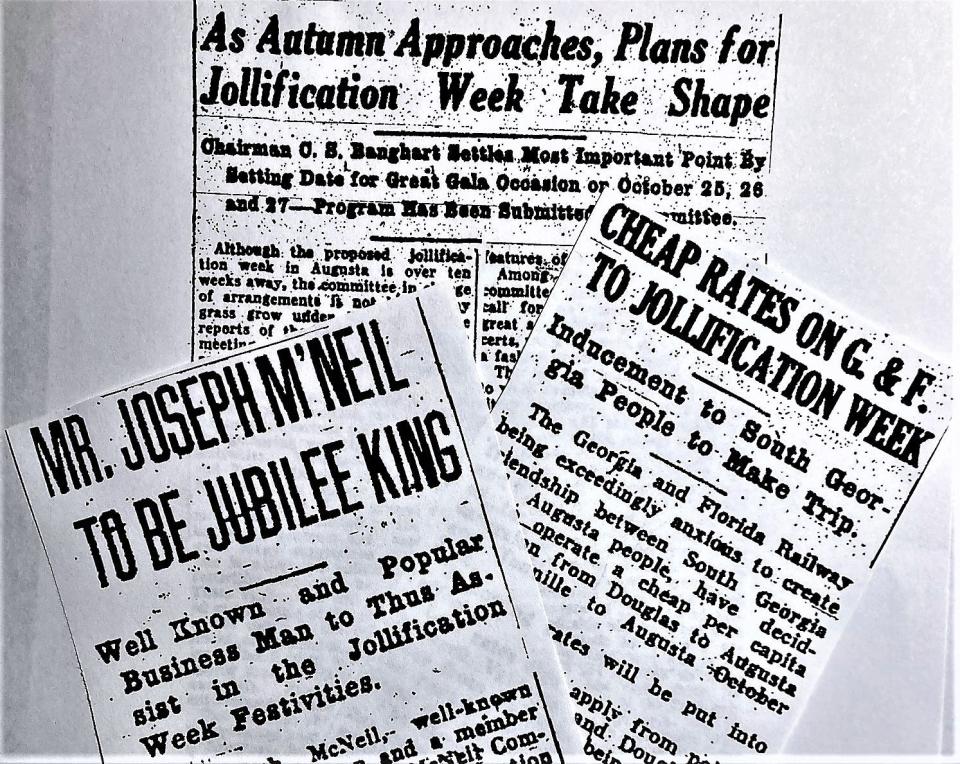A century ago, Augusta set out to challenge New Orleans. Here's how that worked out

One hundred years ago this month, Augusta decided to take on New Orleans.
City leaders and civic boosters vowed to make America forget Louisiana's Mardi Gras celebration with a fun-filled festival of our own.
They called it Jollification Week.
No one claimed credit for the name or the idea, but it fits a period in regional history when the Great War was over, the economy under Warren G. Harding was roaring and local civic clubs were beginning to spring up.
Augusta historian Ed Cashin Jr. called it a time of "Ballyhoo."
It also seems to have fit a national mood. The archives for American newspapers in the beginning of the 1920s show "Jollification Week" being celebrated in Birmingham, San Francisco and even Marion, Ohio, the hometown of President Harding.
The Augusta newspapers – The Chronicle and Augusta Herald – were quickly on board. As The Chronicle editorially stated in May 1922, "We haven't had a merry-maker get-together in some time."
Augusta's business community and civic clubs began to make plans, and the next five months featured reports of meetings, fund-raising efforts and a variety of entertainment proposals.
More Monday Mystery: What stalked the woods and left large footprints in 1977?
Also: A famous fire destroyed a landmark, but something else was missing

"Thousands of Georgians are expected to pour into Augusta during the festival week," the newspaper said and efforts were underway to raise the $10,000 it was expected to cost.
Regular Augustans soon became interested in electing the queen of jollification. Her qualifications were simple – "the most attractive and popular girl in the city."
She, in turn would choose her "king," and both would preside over Jollification Week (which, over the summer months, had quietly been shortened to three days – Oct. 25, 26 and 27.)
Three queen candidates emerged as front-runners in the weekly voting: Annie Hays, Eleanor Schweikert and Elese Van Pelt. Hays, of the 400 block of Watkins Street, eventually won with more than 3,000 votes.
She selected Joseph McNeil, a "well-known young businessman" as her king. (The Chronicle liked the McNeil choice because it appears he was their electrical contractor.)
The mayor and City Council gave them brief civic authority, allowing them to repeal curfew laws and to allow jaywalking on Broad Street.
On Oct. 25, the jollification began.
"From every town within a radius of 150 miles of Augusta, they poured into the city and were entertained by one of the most elaborate programs ever arranged in the South," The Chronicle said. "Mardi Gras could not be mentioned in the same breath as Jollification Week."
There might have been a reason for the regional attraction – discounted train travel.
"The Georgia and Florida Railway being exceedingly anxious to create friendship between South Georgia and Augusta people, have decided to operate a cheap per capita excursion from Douglas to Augusta and from Tennille to Augusta October 26th," The Chronicle reported, adding there were also discounts from Valdosta.
The week arrived and there were parades, dances, concerts, tight-rope walkers, singers … and all the commerce that went with them. "Often it was impossible to move one way or the other on Broad Street," the newspaper said. The week ended with an outdoor ball around the 900 and 1000 blocks of Broad that lasted until a late (or early) hour.
The event ended with a huge street dance centered on Broad and 10th streets. The area was "packed with more dancers than the street could hold."
"By 11 p.m. when the ball was at its height and confetti was being thrown together with the myriad of gay colored balloons sent up, the scene was indeed a gay one, and very suggestive of a mardi-gras dance," The Chronicle would report. And keep reporting.
For months afterward, the newspaper sang the praises of its civic success.
But then something strange happened.
Nothing.
Although the 1922 effort was roundly praised, there does not seem to be any suggestion for an encore. No reason was ever given and New Orleans no doubt sighed with relief.
Bill Kirby has reported, photographed and commented on life in Augusta and Georgia for 45 years.
This article originally appeared on Augusta Chronicle: Augusta festival was planned to last, instead it vanished: Monday Mystery

